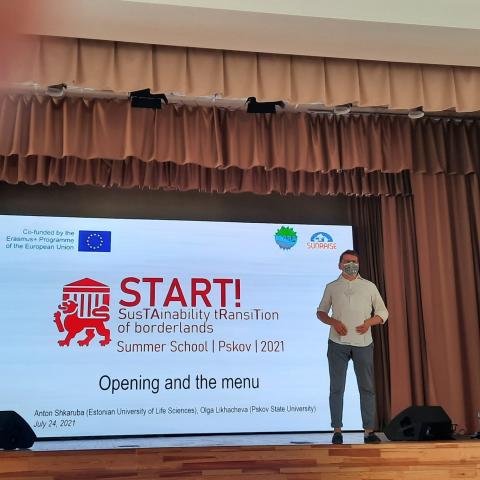International Summer School START! "SusTAinability tRansiTion of borderlands" is on the run

The school is held at Pskov State University that is a highly acclaimed research and training centre for the development of borderland areas. Key partners include St.-Petersburg State University, Gorno-Altaisk State University, Moscow State University, Russian State Hydrometeorological University and the Siberian Federal University. The key international partner of the START! school is Estonian University of Life Sciences.
 The participants of the summer school are getting hands-on project and research experience on the science, technology, management and policy of borderlands that reflects upon the relevant EU experience as well as upon the transferability of this experience to the context of Russia.
The participants of the summer school are getting hands-on project and research experience on the science, technology, management and policy of borderlands that reflects upon the relevant EU experience as well as upon the transferability of this experience to the context of Russia.
The four introductory days of the school gave an overview of sustainability challenges faced by borderlands, including issues related to the state of the biophysical system, management action, economics and geopolitics. This included an overview field excursion and participation in Academia-Praxis workshop “Environmental governance systems in transboundary contexts” (July 26-27). The purpose of this special double bill event was to benefit from collective wisdom and reflection of selected Russian and international experts concerned with the main topics as well as to ensure dissemination of this expertise among the students and early stage researchers interested in development and environmental issues of borderlands.
Next days, participants had an opportunity to wrap up what they had learnt on the workshop and complete the Research Phase 1 with group projects on socio-economic marginality (a transborder geopark), green finances (a green HORECA project), and transborder cooperation over the Peipus Lake region (a cross-border multicultural and environmental festival).
The Research Track 2 of the Summer School program is about to be summarized. It will include in-depth analysis of various aspects of Seto land (Setomaa) in Russia and Estonia, and call for solutions to selected socio-economic and environmental problems of this transboundary area. As a part of the assignment, various policy instruments available in Russia and Estonia, as well as transboundary institutions and arrangements will be explored to back up proposed solutions.







